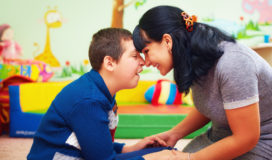Children with autism spectrum disorder or ASD are special individuals who are remarkably unique in their own ways. Their perspective on things is quite extraordinary. You’ll be surprised to see how empathetic, thoughtful, and ingenious they are despite their challenges and the stigma they face.
Communication is a process that involves several elements including a speaker, message, channel, receiver, feedback, and at times noise. Most ASD children, however, may have developmental challenges when it comes to communication. For children with ASD, there may be an impairment in either the way they deliver a message or interpret it. Often times, this results in negative feedback or reaction. We take a look at how ASD affects communication, and how parents and educators can foster functional communication through early intervention such as speech and language therapy for children with ASD.
Autism and Communication
Children with ASD are often self-absorbed and isolated since they have limited communication and social interaction skills. This makes them unsuccessful in conveying a message to the people around them. Their inability to interpret and respond to non-verbal cues makes it a challenge for them to understand the implied messages and changing contexts that happen during a conversation between neurotypical people.
Since each child on the autism spectrum has varying degrees of disability, the severity of their communication challenges can vary. For instance, a child may find it difficult to communicate verbally and in contrast, another child may have a wide vocabulary and can talk about various topics in detail. Likewise, other children with ASD may not be able to interpret nonverbal communication, such as body language, hand gestures, and tone of voice.
Considering these challenges, early intervention can have a significant effect on their development, particularly when it comes to functional communication.
Addressing Communication Challenges
There are a couple of treatments and therapies to address the communication challenges of children with ASD. This can include speech and language therapy. There’s nothing better than starting these treatments during early childhood. Early intervention is a way for ASD children to reach their fullest potential growing up. This can also help them achieve the highest quality of life.
Upon your child’s diagnosis, an ASD specialist may recommend allied healthcare professionals that could further assist in addressing your child’s communication challenges. Speech pathologists can tailor speech and language therapy specific to their needs and interests.
Fostering Functional Communication
Functional communication refers to the ability of an individual to execute and understand a fundamental aspect of communication, which is self-gratification. Simply put, functional communication is used by children to get what they want and need. This includes phrases such as “I want to”, “I need that”, “I am hungry”, “I need water”, etc.
In general, these kinds of messages are what children learn during the early stages of communication. This begins during infancy such as crying when hungry, body language, and hand gestures, and as children learn words, this progresses into constructing simple sentences. In the case of ASD children who experience difficulties with speech and language, functional communication may be impaired. But with the right treatment and therapy, improving this area of communication can benefit them as they grow up.
As parents, it would benefit to work with a speech and language therapist to find better means of communication for your child. With the help of a specialist, the goal should be to start slow and work your way into incorporating more sophisticated means of communication, for your child.
Once you have established a means of communication, you can start teaching new words to your child. To do this, you have to be able to model and interpret it into action. This way, they can easily associate words with specific hand gestures and body language. The last step is to provide reinforcements so that your child can use new words. For instance, you can teach them to use a specific word to get what they need. If you want to know more about fostering your child’s functional communication, you can talk to our speech and language experts at Pulse Therapy and Language Center.






